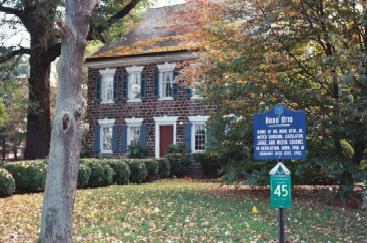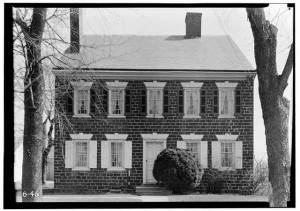522 Kings Highway
Mickleton NJ
Private Residence - owned by
Bob,
Corrin and Elizabeth Sellen

Current photograph of the Otto-Tonkin House
taken
from the East Greenwich Township Master Plan 2004
This
property was first deeded to Nicholas Young in 1688 and was commonly known as
the "Neat Farmers Plantation." The
plantation was officially surveyed for tax purposes by Thomas Gardiner, the current
owner's [Corrine Butler Sellens] first ancestor to the English Colonies.
Joseph
Young built the original 2-1/2 story stone building consisting of two rooms on
the first floor, two rooms on the second, with a half story loft. [A second source
states that the Otto-Tonkin House was probably built by William Skull after 1766.]
The original house is the current rear first and second floors. Today the
1725 section is over 90% and the 1819 section over 95% intact. The "old Kings
Highway" followed the high ground in the rear of the house as it faces today.
The
property was seized by the High Sheriff, Thomas Denny, who conveyed it by deed
dated August 1, 1772 to Bodo Otto, Jr., who had rented the property prior to March
1, 1771.
Bodo
Otto, Jr. was born in Hanover, Germany in 1748 and was brought to this country
by his father in 1752. Bodo
Otto [Sr, also a physician, llived in the Philadelphia area, where he practiced
his profession, and tutored his son as a preparation for the University of Pennsylvania.]
In 1771 Bodo Otto, Jr. received a degree of the Bachelor of Medicine from the
University of Pennsylvania. In August 1772, the father purchased the farm of one
hundred acres in what is now known as the village of Mickleton,
including the house known as the Otto-Tonkin House. Bodo Otto Jr. returned to
Mickleton to start his practice following his marriage to Catherine Schweighauser
in 1772.
These
devoted physicians, the father and his two sons, served as surgeons with George
Washington's army during the dreadful winter at Valley
Forge, where the father was in charge of the hospitals. After the war ceased,
they returned to the communities in which they lived, where their personal qualities
and their skill made them beloved by all those who knew them.
Rev.
Nicholas Collin, D.D., the rector of the Swedish Lutheran Church [now Trinity
Episocopal Old Swedes Church] in Swedesboro from 1770 to 1776 was a close
friend of the Bodo Otto family, and mentioned them frequently in his "Journal"
which was translated by Amandus Johnson in 1936 and published by the New Jersey
Society of Pennsylvania. [Title: The journal and biography of Nicholas Collin,
1746-1831 : the journal translated from the original Swedish manuscript / by Amandus
Johnson ; with an introduction by Frank H. Stewart.] A copy of this book can be
found at the The Historical Society of Pennsylvania.
[See an excerpt below]
On
July 24, 1775, Bodo Otto, Jr. received the appointment of surgeon of Colonel Reed's
Battalion. Along with his father, and his brother, Dr. John Otto, he spent the
winter at Valley Forge with Gen. George Washington. He served until 1781.
In
March, 1778, when his wife and children were home alone, Otto's house was burned
by British sympathizers [during the battle of Saunders
Run]. (Dr. Otto never moved back into the house).
Neighbors were successful
in saving the house, but not the outbuildings. The oldest outbuildings are the
smoke house and ice house dated 1800.
Dr.
Otto did not move back into his house; after this the family moved to Swedesboro.
Bodo Otto died on January 20, 1782, at the age of 33 of consumption [tuberculosis]
at the Death of the Fox Inn in Clarksboro and is
buried
at Trinity Church in Swedesboro.
His property (including his home in
Mickleton) was divided among his children.
In
February of 1782, a month after Bodo Otto's death, his friend Dr. Collin writes:
"Preached a funeral sermon for the Med. Doctor Bodo Otto in his house, a
few miles from Swedesboro, and buried him at the church in Swedesboro. The old
doctor, his father came here before my time from Luneburg, with his family, a
devout man who brought up his children in the Evangelical religion. His son had
practiced medicine at the place since 1772. He was also a magistrate and a colonel
of the militia under the new Government. He was in all respects an honorable man,
and he has so far as he was able to, prevented such evil during the war. Among
other praiseworthy actions he obtained pardon for one of the refugees who had
burnt down his own (Otto's) house, and who for this and other crimes, would otherwise
have been hung. Hils illness, which was consumption, began last autumn. I visited
him often during the whole time he was ill; at times I sang German death psalms;
which are quite lovely, lent him books in the same language, and a month before
he died I gave him the Lord's Supper. He prepared himself like a true Christian.
I had promised to be present at the end. At the approach of death a little after
midnight, he immediately sent a man for me. We rode in full gallop, but nevertheless
arrived too late. The funeral text was "Blessed are the dead which die in
the Lord, and their words do follow them." His old father stood trembling
at his son's grave weeping bitterly."
 The Bodo
Otto aka Otto-Tonkin House as it looked in 1936
The Bodo
Otto aka Otto-Tonkin House as it looked in 1936 In
1798 the property was sold to Samuel Tonkin who rebuilt the house. The house was
accidentally burned again in 1818 and was once again rebuilt by the Tonkins.
The
house was named to the National
Register of Historic Places in 1977 after Bob and Mary Ruth Talley completed
a comprehensive restoration.
Additional
Information and a photograph of this house is located in the Gloucester County
NJ web site.
The
Historic American Buildings Survey (HABS) and the Historic American Engineering
Record (HAER) are among the largest and most heavily used collections in the Prints
and Photographs Division of the Library of Congress. See
the photographs, floorplans, and documents submitted in 1937 regarding this historic
building.
Descendants
of Bodo Otto, Sr. should contact the
Bodo Otto Association. In
2005 The Bodo Otto Family will hold a reunion June 24-26.2005.
Read more about this.

